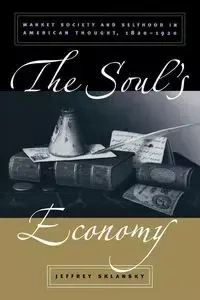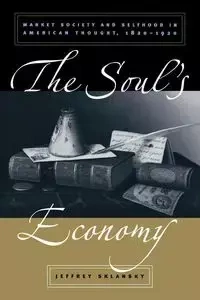The Soul's Economy - Jeffrey Sklansky
The Soul's Economy - Jeffrey Sklansky
- Market Society and Selfhood in American Thought, 1820-1920
AutorzyJeffrey Sklansky
For a century after Independence, the dominant American understanding of selfhood and society came from the tradition of political economy, which defined freedom and equality in terms of ownership of the means of self-employment. However, the gradual demise of the household economy rendered proprietary independence an increasingly embattled ideal. Large landowners and industrialists claimed the right to rule as a privilege of their growing monopoly over productive resources, while dispossessed farmers and workers charged that a propertyless populace was incompatible with true liberty and democracy.
Amid the widening class divide, nineteenth-century social theorists devised a new science of American society that came to be called "social psychology." The change Sklansky charts begins among Romantic writers such as Ralph Waldo Emerson and Margaret Fuller, continues through the polemics of political economists such as Henry George and William Graham Sumner, and culminates with the pioneers of modern American psychology and sociology such as William James and Charles Horton Cooley. Together, these writers reconceived freedom in terms of psychic self-expression instead of economic self-interest, and they redefined democracy in terms of cultural kinship rather than social compact.
EAN: 9780807853986
Symbol
287FUG03527KS
Rok wydania
2002
Oprawa
Miekka
Format
15.6x23.4cm
Język
angielski
Strony
332

Bez ryzyka
14 dni na łatwy zwrot

Szeroki asortyment
ponad milion pozycji

Niskie ceny i rabaty
nawet do 50% każdego dnia
Niepotwierdzona zakupem
Ocena: /5
Symbol
287FUG03527KS
Kod producenta
9780807853986
Rok wydania
2002
Oprawa
Miekka
Format
15.6x23.4cm
Język
angielski
Strony
332
Autorzy
Jeffrey Sklansky

Tracing a seismic shift in American social thought, Jeffrey Sklansky offers a new synthesis of the intellectual transformation entailed in the rise of industrial capitalism.
For a century after Independence, the dominant American understanding of selfhood and society came from the tradition of political economy, which defined freedom and equality in terms of ownership of the means of self-employment. However, the gradual demise of the household economy rendered proprietary independence an increasingly embattled ideal. Large landowners and industrialists claimed the right to rule as a privilege of their growing monopoly over productive resources, while dispossessed farmers and workers charged that a propertyless populace was incompatible with true liberty and democracy.
Amid the widening class divide, nineteenth-century social theorists devised a new science of American society that came to be called "social psychology." The change Sklansky charts begins among Romantic writers such as Ralph Waldo Emerson and Margaret Fuller, continues through the polemics of political economists such as Henry George and William Graham Sumner, and culminates with the pioneers of modern American psychology and sociology such as William James and Charles Horton Cooley. Together, these writers reconceived freedom in terms of psychic self-expression instead of economic self-interest, and they redefined democracy in terms of cultural kinship rather than social compact.
EAN: 9780807853986
For a century after Independence, the dominant American understanding of selfhood and society came from the tradition of political economy, which defined freedom and equality in terms of ownership of the means of self-employment. However, the gradual demise of the household economy rendered proprietary independence an increasingly embattled ideal. Large landowners and industrialists claimed the right to rule as a privilege of their growing monopoly over productive resources, while dispossessed farmers and workers charged that a propertyless populace was incompatible with true liberty and democracy.
Amid the widening class divide, nineteenth-century social theorists devised a new science of American society that came to be called "social psychology." The change Sklansky charts begins among Romantic writers such as Ralph Waldo Emerson and Margaret Fuller, continues through the polemics of political economists such as Henry George and William Graham Sumner, and culminates with the pioneers of modern American psychology and sociology such as William James and Charles Horton Cooley. Together, these writers reconceived freedom in terms of psychic self-expression instead of economic self-interest, and they redefined democracy in terms of cultural kinship rather than social compact.
EAN: 9780807853986
Niepotwierdzona zakupem
Ocena: /5
Zapytaj o produkt
Niepotwierdzona zakupem
Ocena: /5
Napisz swoją opinię

